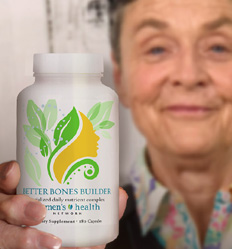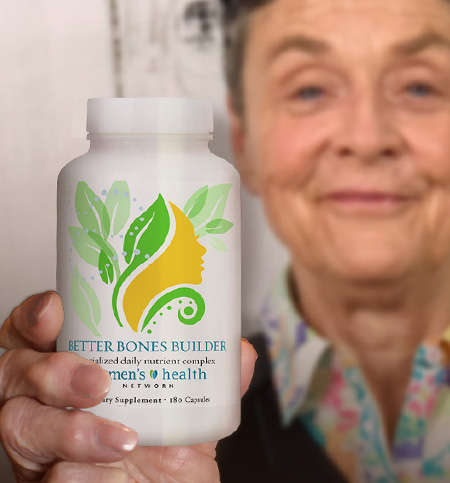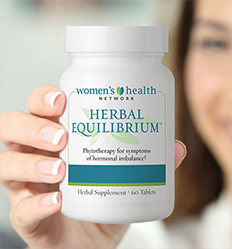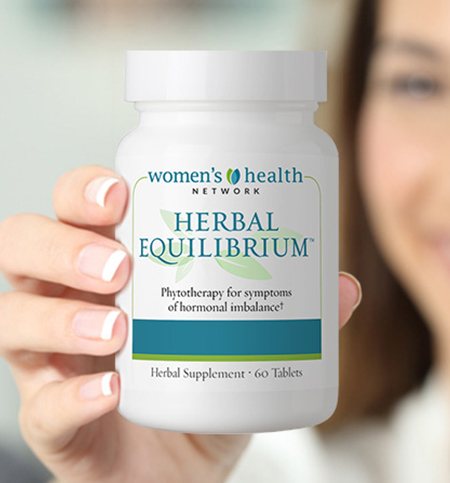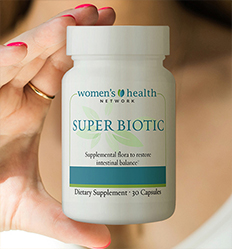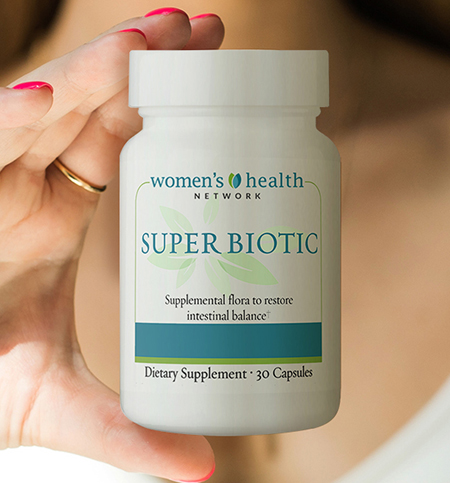Authored by Dr. Susan E. Brown, PhD
Who needs to take a bone supplement?
If you are thinking about taking a supplement for your bones, you probably fall into one or more of the following categories:
- You have been diagnosed with osteoporosis.
- You haven’t been diagnosed yet, but have bone risk factors.
- You fractured a bone.
- You have been told you have osteopenia.
- You are entering menopause.
- You want to avoid future problems by taking a preventative approach to your bone health.
Your category or categories will guide you in designing a comprehensive approach to supplementation. Let’s take a look at some of the different types of vitamin supplements for bone health and how to choose the best ones to meet your needs.
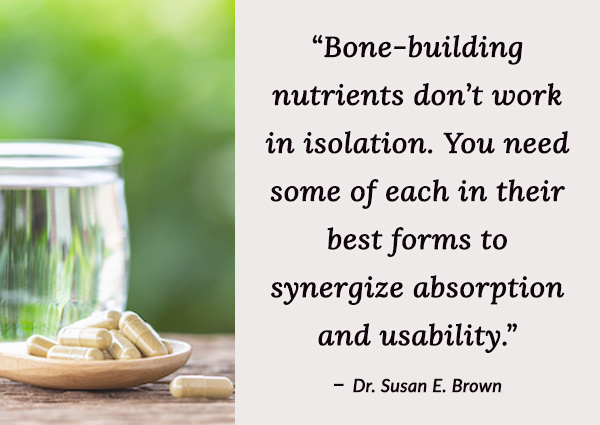
Bone supplements for higher risk women
As I always say to the women I work with, bone health issues can be silent and overlooked for years, so If you’ve been diagnosed with osteoporosis, experienced a fracture, have active bone loss or have other bone health risk factors, take heart — you now know what needs to be fixed!
Exercise and diet are part of taking a natural approach to bone health. Supplementation needs to be an important part of your strategy too.
Nourish your bones with key vitamins and minerals
Weakened bones can be a direct cry for help from your body that your bones need corrective nourishment. To be effective, your bone health supplement must contain the complete complex vitamins and minerals required by bone for optimal bone building and strengthening. For higher risk women, these nutrients are:
- Calcium
- Magnesium
- Chromium
- Silica
- Zinc
- Manganese
- Copper
- Boron
- Potassium
- Vitamin D
- Vitamin C
- Vitamin A
- Vitamin B6
- Folic acid/folate (Vitamin B9)
- Vitamin B12
- Vitamins K1 and K2
Choose a supplement that provides nutrients in absorbable and alkalizing forms
Now that you have the list, you need to make sure that you take in these nutrients in forms that offer optimal absorption and bone-building support. For example, the calcium contained in my Better Bones Builder is Aquamin, a form of calcium extracted from seaweed harvested from the pristine waters of the North Atlantic. Aquamin offers superior mineral bioavailability, increasing calcium’s ability to work synergistically with magnesium and vitamins D and K and other vital nutrients to help protect and repair your bones.
Other nutrient forms to look for in your supplement include:
- Vitamin D must be Vitamin D3 and not less absorbable D2.
- Look for Vitamin C as Vitamin C ascorbate, the vitamin’s more bioavailable form.
- Magnesium bisglycinate chelate and magnesium aspartate are more absorbable forms of magnesium.
- High mineral content in the supplement boosts its ability to alkalize.
Also, remember that nutrients need the right amounts of other nutrients to be effective. This is especially true with calcium! Calcium requires Vitamin D for absorption, but also Vitamin K2 to direct where calcium goes in the body. Vitamin C appears to enhance both calcium absorption and Vitamin D’s effect on bone metabolism, and so needs to be present too. Calcium and magnesium function together so that a deficiency of one markedly affects the metabolism of the other.
Trace minerals support bone building and alkalize balance
Your bones also need trace minerals — like copper, zinc and manganese — which can be very hard to get in adequate amounts today with food alone. For example, 75% of all diets fail to contain even the Recommended Daily Allowance of 900 mcg for copper. Our zinc intake averages only 50% of the RDA, and our manganese intake is generally inadequate. These minerals are important for buffering acids and promoting alkaline balance in the body.
I’ve formulated my Better Bones Builder to include all of these important bone-building ingredients for women who fall in this high risk category. When your bones are nourished, they can begin the process of repair and replenishment, supported by exercise and an alkaline diet.
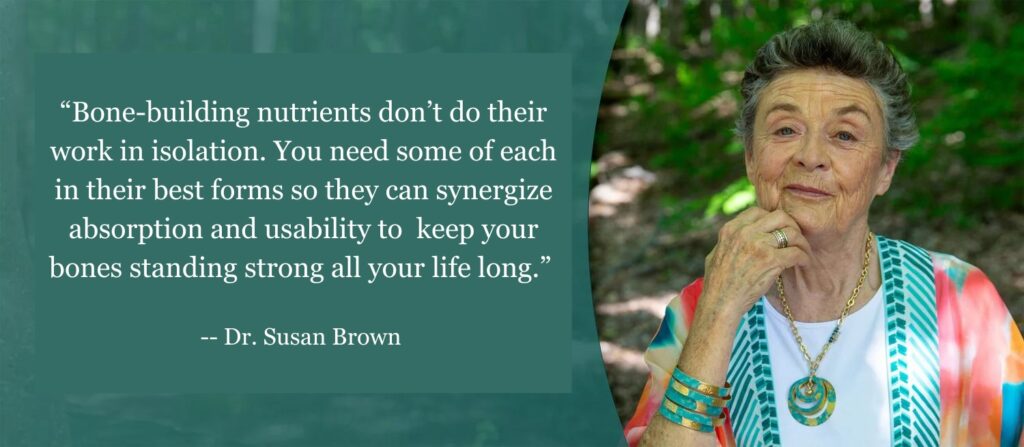
Bone supplements for osteopenia support
If you have been told you have osteopenia, all that’s being relayed to you is that your bones are less dense than that of the average person in their 20s. Osteopenia is not a true diagnosis or a reason on its own to prescribe a bone medication.
However, osteopenia is your wake up call to start making sure your bones have everything you need.
Your bones are living tissue and like other living tissues, they function best when nourished and supported. When you have osteopenia, you want to be getting enough of prime bone-building vitamins and minerals to make sure your reserves are topped off and your bones are nourished:
- Vitamin D3
- Vitamin K as K1 and K2
- Calcium
- Magnesium
- Zinc
- Manganese
- Boron
To get these key vitamins and minerals in one place, start with my Better Bones Basics: a daily vitamin and mineral supplement for bone health that contains everything your bones need.
Hormone-balancing supplements for women in menopause
On average, a woman loses 10% of her bone mass during the menopause transition — an entirely normal part of the bone breakdown and build up process. While most women have enough bone mass to handle this loss just fine, some women may experience excessive bone loss of up to 20%.
One key factor in your bone health risk during menopause is the state of your hormonal balance. Hormonal changes during menopause disrupt your body’s natural bone building process. Estrogen helps preserve calcium in the body and prevent bone breakdown, but when estrogen falls out of balance with other hormones, your bones lose this benefit.
Low progesterone levels common in perimenopause may also affect bone-building cells, disrupting the natural process of bone breakdown and repair. Interfering with this process can have a negative effect on the health of your bones over time.
Researchers have found that most bone loss occurs one year before and two years after a woman’s final menstrual cycle. These three years are an important window of time for bone protection that you need to take advantage of by keeping your hormones balanced with a natural supplement for hormonal support and/or a separate bioidentical progesterone cream supplement.
Probiotics for bone health: an exciting new form of bone support
You can’t benefit from nutrients in your food or nutrients in your supplements if you can’t absorb them. If you have experienced digestive issues in the past, this is a red flag that your digestive tract needs an infusion of good gut flora to assist with digestion and absorption. Evolving studies on probiotics and bone health have shown that probiotics can be helpful for stemming bone loss, especially during menopause. Taking a daily probiotic is a good way to make sure you’re regularly replenishing healthy gut bacteria.
The sign of a quality probiotic is one that includes several strains of beneficial bacteria like our Super Biotic Probiotic.
Healing from a fracture? You need more antioxidants
Healing from a bone fracture requires all the same intensive bone support supplementation that I just described. On top of this, you may need extra antioxidant support.
Antioxidants repair oxidative damage. When a bone fracture occurs, free radicals are generated by the damaged tissues. In particular, this damage occurs as the tightly bound collagen strands running through the mineral phase of bone are forcefully broken. These ruptured collagen strands interact with oxygen-yielding radical metabolites. These free radicals are associated with inflammation, further breakdown of bone collagen and excessive bone turnover.
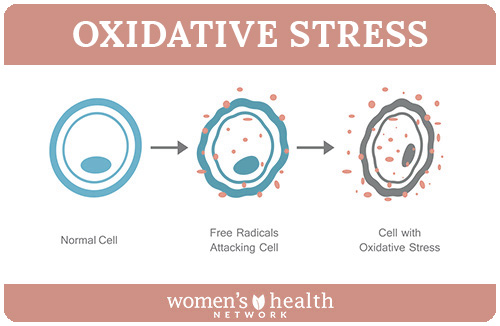
Antioxidants repair oxidative damage from free radicals. In particular, antioxidants Vitamin C and lycopene have been shown to improve fracture healing in animal models and cultured human cell lines. When I reformulated Builder a few years ago based on the latest research, I added more antioxidants to the blend to provide protection from oxidative stress and extra support for women healing from fracture.
Nourishing the body to reduce inflammation naturally speeds healing. Try adding an Omega-3 fatty acids supplement to naturally soothe the inflammatory process and speed healing.
Which bone supplements do you need? Take our free quiz!
To understand the best supplements for your bones, I have developed a free Bone Health Quiz that provides you with personalized supplement recommendations based on your risk factors. Your answers to these simple questions about your bone health and overall health can reveal a surprising amount of information, including the many steps you can take to help restore your bone health.
Take the quiz now to find out the best supplements for your bones. I have worked with Women’s Health Network to take great care in formulating superior quality natural bone health supplements. Women have reported having tremendous results with these supplements.







